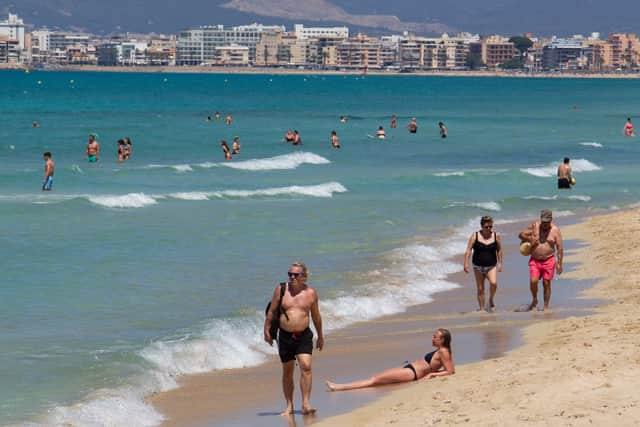Majorca, Ibiza and Menorca issued ‘red alerts’ as Spain’s Balearic Islands at ‘high risk’ of wildfires
and live on Freeview channel 276
British holidaymakers travelling to Majorca, Ibiza and Menorca are being warned that the wildfire risk on the islands has been raised to “extreme” and “very high”.
Spain has been sweltering in extreme temperatures in recent weeks as a heatwave continues to sweep across Europe, with some areas seeing highs above 40C.
Advertisement
Hide AdAdvertisement
Hide AdA forest fire red alert was issued in Majorca by the Palma Met Office on Tuesday (25 July) due to the heat, and Spain’s meteorological agency AEMET has issued an “extreme” red alert for the island, which is home to the popular resorts of Magaluf, Palma Nova and Santa Ponsa.


AEMET put the southern and eastern tip of Majorca at “extreme” risk of wildfires, while Ibiza and Menorca were both placed on “high alert”.
Firefighters told the Majorca Daily Bulletin that the region’s wooded areas had become a “tinder box” due to the scorching weather, before adding that they are well equipped for any blazes that break out.
It comes after AEMET last week issued extreme weather risk warnings - the maximum alert level - for Majorca as the mercury pushed above 40C in some parts of the island.
Advertisement
Hide AdAdvertisement
Hide AdThe UK Foreign Office has warned that forest fires occur frequently in Spain during the summer months, including in the Spanish islands, and urged holidaymakers to check with their travel provider before travelling and to follow the advice of local authorities “at all times”.
Elsewhere in Europe, thousands of Britons have been evacuated from the Greek island of Rhodes, which has been ravaged by wildfires. Repatriation flights landed in the UK overnight and on Tuesday (25 July) and holiday operators are continuing to cancel flights and holidays to the island. Evacuations were also ordered on the islands of Corfu and Eviva after temperatures rose above 40C again.
The UK Foreign Office has not formally advised people not to travel to Greece, including Rhodes and Corfu which are both battling wildfires. Fresh advice recommends that holidaymakers due to travel to an area of Greece that might be affected by wildfires contact their travel operator, or accommodation provider, before travelling to check it is not currently impacted.
It also recommends that anyone going to Greece has “appropriate insurance”, adding that it should “ cover your itinerary, planned activities and expenses in an emergency”.
Advertisement
Hide AdAdvertisement
Hide AdWildfires have also broken out in parts of Italy forcing Palermo Airport, on the island of Sicily, to announce a temporary closure on Monday night (24 July) as fires burned around its perimeter.
The blaze started above the town of Cinisi before reaching the edge of the airport, forcing it to remain shut until 0900 GMT (10am BST) on Tuesday (25 July) to allow firefighters to put out fires which were also disrupting local road and rail traffic.
Temperatures rose to 47.6C in some parts of eastern Sicily on Monday sparking a wind-fed brush fire to burn near Palermo, as well as several other blazes on the Mediterranean island, including near the tourist resort of Cefalu. Wildfires also broke out in Calabria in southwest Italy, including in the rugged Aspromonte mountains.
On Sardinia, three flights from Milan, Paris and Amsterdam were forced to land at other airports on the Italian island because the tarmac in Olbia was deemed dangerously hot on Monday afternoon, RAI state TV said, with the temperature hitting 47C.
Comment Guidelines
National World encourages reader discussion on our stories. User feedback, insights and back-and-forth exchanges add a rich layer of context to reporting. Please review our Community Guidelines before commenting.
